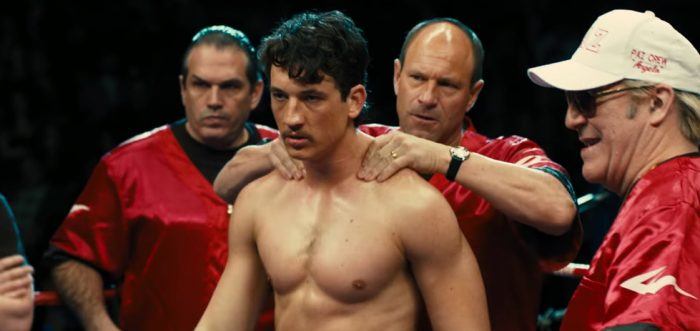
Miles Teller and his patchy moustache play Vinny ‘The Pazmanian Devil’ Pazienza, a local Providence boxer with a rising reputation after he wins two world title fights. His potential is tragically cut short by a car accident, leaving him with a broken neck. Against doctor’s orders, Pazienza builds back his strength with trainer Kevin Rooney (Aaron Eckhart) to take part in what could be the last fight of his life. What we get in Ben Younger’s latest film is little more than a cavalcade of training clips and precious testosterone flexing, that a better boxing film would’ve condensed into a two-minute montage.
This by-the-numbers Oscar-baiting true-to-life underdog tale suffers from fairly poor pacing: clocking in at just under two hours, its first act drags on with little drama to carry the plot forth. You could excuse it as an attempt by Younger to build emotional foundations upon which our empathy could fall when Pazienza is injured. It plays as just a lot of men yelling at each other in close range, or alternatively muttering sentences that would work aptly in the voiceover during sports advertisements: ‘I know I can do this’ or ‘I have more in me’.
Miles Teller, who realised his potential with a brutal performance in Whiplash, has little to work with here. When he’s not punching something or someone, he’s spouting clichéd truisms. Our first proper introduction to the Pazienza persona is about two minutes into the film, Teller’s appearing in nought more than a thong. His muscular physique may be the only realised goal of this entire production. In a similar move to extremes, Aaron Eckhart’s more Christian Bale-esque transformation with a potbelly and bald cap makes him almost unrecognisable in the role of Rooney, your classic trainer-whose-demons-are-repressed-with-alcohol. Both men are fully committed to their roles, but there’s little they can dredge from an uninspired script.
Despite the runtime of 116 minutes, there’s little attempt to flesh out Pazienza beyond his love for the sport. In his family he is a revered son with a doting mother (Katey Sagal). In the boxing gym he’s beloved, and in the ring he appears to have few enemies. His braggadocio is never distasteful or overdone, even in the press conferences where he should be spouting incendiary smack talk. After the accident, his responses are measured, never too angered, never too tragic. Everything is an act of controlled machismo, emotions reined in tight. This all makes a character who is a little too neatly moulded to be three-dimensional.
Whilst you might forgive the average script and the performances that aim high but don’t quite hit the mark, the representation of women throughout is appalling. Female characters are either sexless family members, or interchangeable sex objects. Even in the framing of a shot, they’re background fodder or literally standing in the shadow of a man. There is an ongoing punchline where Pazienza trots out different girlfriends but their appearance remains so similar, their personalities so under-scripted, or in some cases entirely non-existent, that the family members mistake their names. Women in this world exist only to serve men: as strippers gyrating atop Pazienza after his world title win; a girlfriend lying naked on a bed as he remains fully clothed, showering her with casino chips; or the mother who only encourages and feeds him.
Yet there’s a moment in the film during the final fight when we’re given the briefest of insights into what Bleed for This could’ve been if it stopped being a B-grade emulation of its predecessors. Pazienza is deep into a 12-round match, he’s receiving a battering to his newly healed body, the stadium is roaring… and then the music cuts out. No audience chanting, no trainer yelling from the sideline. Just the sound of punches landing on bodies, gloves on skin. It is the singular most powerful moment in this two-hour affair, and it barely lasts ten seconds.
The poster for Bleed for This sells us on the idea that ‘This is what the greatest comeback in sports history looks like’. What we’re given instead is a shiny-looking sports movie no different from the ones we’ve seen many times before, where men can beat their chests with ferocity while women applaud from the sidelines.
